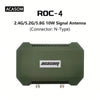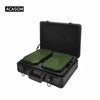Dive into More Advantages of Drone Signal Jammers
The rise of drone technology has brought about numerous advancements in industries such as agriculture, logistics, filmmaking, and military operations. However, this proliferation of unmanned aerial vehicles (UAVs) has also led to a range of security concerns. Drones can be used for malicious purposes, such as unauthorized surveillance, smuggling, or even attacks. To address these threats, drone signal jammers have become an essential tool for ensuring the safety and security of sensitive areas. In this article, we’ll explore the advantages of drone signal jammers and their role in protecting critical infrastructure, military installations, and public spaces.
What is a Drone Signal Jammer?
A drone signal jammer is a device designed to disrupt the communication signals between a drone and its operator, effectively rendering the UAV inoperable. These jammers work by emitting radio frequency (RF) signals that interfere with the drone’s control systems, including GPS, Wi-Fi, and other communication channels. The result is either a loss of control, forced landing, or the drone being returned to its point of origin.
Drone signal jammers are available in various models, with some focusing on a specific frequency range (e.g., GPS or Wi-Fi), while others can block multiple frequencies simultaneously. Depending on the technology and sophistication of the jammer, the range of operation can vary from a few hundred meters to several kilometers.
1. Enhanced Security for Critical Infrastructure
One of the primary advantages of drone signal jammers is their ability to secure critical infrastructure from potential drone threats. Areas such as airports, military bases, power plants, and government buildings are prime targets for drone surveillance or attacks. Drones can be used to gather intelligence, deliver contraband, or even conduct reconnaissance for a larger-scale attack. By deploying a drone signal jammer, these high-value assets can be protected from unwanted UAV intrusions.
Drone jammers are particularly effective in sensitive areas, as they can prevent drones from flying into restricted airspace or coming too close to vulnerable installations. They create a "no-fly zone" around critical infrastructure, preventing drones from accessing the area altogether or forcing them to land before they can cause any harm.
2. Prevention of Unauthorized Surveillance
Drones equipped with cameras and other sensors are often used for unauthorized surveillance, whether by criminals, competitors, or other malicious entities. In sensitive locations such as corporate offices, research facilities, or private residences, the risk of being monitored by drones is a real and growing concern.
A drone signal jammer can disrupt the GPS or video transmission signals, making it difficult or impossible for the drone to capture or transmit data. This ensures that privacy is maintained and that sensitive information remains protected. Additionally, the jammer can force the drone to land, preventing any further surveillance activities.
3. Counteracting Drone Smuggling and Illegal Activities
Smuggling is another serious problem that drones can exacerbate. Drones can be used to transport illegal goods, such as drugs, weapons, or contraband, across borders or into prisons. In this context, drone signal jammers are a powerful tool for law enforcement and security personnel.
By using drone jammers, authorities can prevent drones from entering restricted airspace or flying low over sensitive areas. In the case of prisons, where drones may be used to deliver illegal items to inmates, a jammer can stop the UAV in its tracks, reducing the risk of smuggling operations. Jamming systems can be strategically placed around borders or prison perimeters to effectively neutralize drone-based smuggling attempts.
4. Improved Safety for Public Events and Gatherings
Public events, concerts, protests, or large gatherings present significant security challenges. The presence of drones flying overhead poses a safety risk, especially in crowded areas. Drones can potentially cause accidents, disrupt public order, or even be used for malicious purposes, such as dropping dangerous substances or explosives.
Drone signal jammers offer a practical solution to enhance public safety. By blocking communication signals to drones, jammers prevent them from operating in sensitive areas. Event organizers and security teams can deploy these systems to ensure that UAVs do not pose a threat to attendees. This added layer of protection creates a safer environment for large-scale public events, reducing the potential for drone-related incidents.
5. Military and Defense Applications
In the military and defense sectors, drone signal jammers are invaluable tools for countering enemy drones on the battlefield. Drones are increasingly used for reconnaissance, surveillance, and even as weaponized platforms capable of carrying explosives or missiles. In conflict zones, enemy forces may deploy drones to gather intelligence, assess enemy positions, or launch surprise attacks.
To mitigate these threats, military forces employ advanced drone signal jammers to disrupt or neutralize enemy UAVs. By blocking communication between the drone and its operator, these jammers force the UAV to lose control, return to its origin, or crash. In some cases, military jammers can even take control of the drone and turn it into a tactical asset for the defending forces.
Jammers can also be integrated into larger defense systems, offering automated detection and disruption of hostile drone activity. These systems are highly effective in preventing enemy drones from reaching critical assets, ensuring the security of military operations and installations.
6. Protection Against Drone-Based Terrorism
The potential for drones to be used in terrorist attacks has raised significant concerns among security agencies worldwide. Drones can be armed with explosives or other harmful payloads, making them a low-cost, high-impact tool for terrorists. Attacks on crowded public spaces, government buildings, or key infrastructure can be devastating.
Drone signal jammers are critical in countering drone-based terrorism. These systems can disable drones before they reach their target, preventing potential harm and saving lives. Governments and security agencies are increasingly adopting drone jammers as part of their counterterrorism strategies, using them to detect and neutralize threats in real-time.
7. Non-Lethal and Cost-Effective Solution
One of the most significant advantages of drone signal jammers is that they are non-lethal. Unlike other counter-drone technologies, such as anti-aircraft systems or directed-energy weapons, jammers do not destroy the drone. Instead, they disrupt the drone’s communication, forcing it to land or return to its operator. This makes jammers a safer and more humane option for neutralizing threats, especially in civilian or public settings.
Additionally, drone signal jammers are a cost-effective solution compared to more complex counter-drone technologies. While drone defense systems like radar, laser weapons, or kinetic interceptors can be expensive and require significant maintenance, jammers are relatively affordable, making them accessible for a wide range of users, from governments to private enterprises.
8. Legal and Ethical Considerations
The use of drone signal jammers is subject to legal and ethical considerations. In many countries, the jamming of communications is restricted due to concerns over interference with legitimate wireless services. However, in jurisdictions where drone security is a priority, regulatory frameworks are evolving to allow the controlled use of jammers for protecting public and private spaces.
Ethically, the use of jammers raises questions about privacy and the potential for abuse. It is essential that drone jammers are used responsibly, ensuring they do not disrupt legal drone operations or infringe on the rights of individuals. Proper regulations, licensing, and enforcement are needed to strike a balance between security and privacy.
Drone signal jammers provide a robust solution to many of the security challenges posed by the increasing use of unmanned aerial vehicles. By disrupting communication between drones and their operators, these devices enhance security in critical infrastructure, protect against unauthorized surveillance, counter smuggling operations, and ensure safety at public events. In the military and defense sectors, they are invaluable tools for neutralizing enemy UAVs. Additionally, their non-lethal and cost-effective nature makes them a compelling choice for a wide range of applications.
As drone technology continues to evolve, so too will the tools used to defend against malicious UAV activities. Drone signal jammers are an essential part of this security landscape, providing a reliable and efficient means of safeguarding sensitive areas and ensuring public safety in an increasingly drone-filled world.






